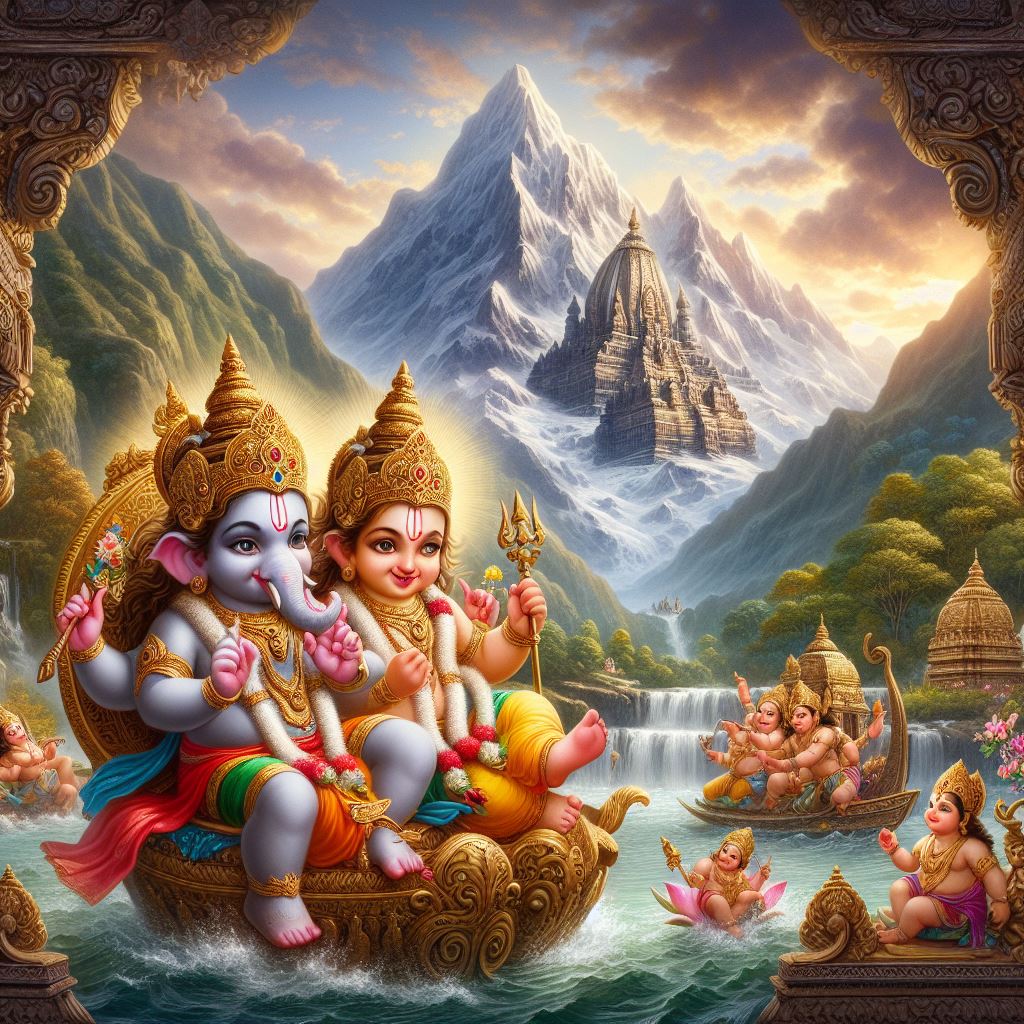The Greatness of Akṣaya Tṛtīyā
Introduction:
In this article let’s understand the real glory of the ‘‘akṣayatṛtīyā’ festival. In the modern times, Hindus have reduced this great day to a day for purchasing Gold assuming that would make their wealth inexhaustible. But the truth is exactly opposite to this.
As per the sacred scriptures of Hinduism, we are asked to give away on this day, instead of buying and bringing in. Giving generates the merit of donation. Buying is an expense of our spiritual merit. But somehow buying gold has become the standard in modern times.
Let’s now look at the greatness of this sacred day from the scriptural perspective.
In the ‘Bhaviṣya Purāṇa’ occurs a chapter named ‘akṣayatṛtīyā vrata varṇanaṃ’ which is narrated as a discourse from Kṛṣṇa to Yudhiṣṭhira. Elaborating the glory of this day viz. The ‘‘akṣayatṛtīyā’ day, Śrī Kṛṣṇa tells that whatever religious acts are performed on the ‘Tṛtīyā tithi’ that occurs in the bright fortnight of the ‘Vaiśākha’ month, all such acts generate imperishable fruition or imperishable spiritual merit.
“वैशाखस्य सितामेकां तृतीयां शृणु पाण्डव ॥1b
स्नानं दानं जपो होमः स्वाध्यायः पितृतर्पणम् ।
यदस्यां क्रियते किञ्चित्सर्वं स्यात्तदिहाक्ष यम् ॥” (Bhavishya Purana 4:30:1b-2)
“O son of Pāṇḍu! Listen about the greatness of Tṛtīyā tithi that occurs in the bright fortnight of the Vaiśākha month. Whether it is taking a holy bath, donating things to others, ‘japa’, sacrifice, study of the scriptures, or even water oblations to the Pitṛ-s etc., whatever is performed on this day, that becomes ‘akṣaya’ i.e. of imperishable merit”.
Here let’s deliberate upon each term in brief to understand them better.
- स्नानं (snānaṃ): Typically, by ‘snānaṃ’ we think opening shower and standing under it rubbing our body with soap. That’s just ‘bathing’., ‘snānaṃ’ refers to bathing as per the procedures instructed in scriptures. There are few procedures mentioned such as – ‘nadī snānaṃ’, ‘samudra snānaṃ’, ‘mṛttikā snānaṃ’, ‘mantra snānaṃ’ etc. If we cannot perform any of these, then at the least what we can do is to chant the holy names of the seven sacred rivers, vide ‘Nārada Purāṇa (1:66:27)‘ and begin taking shower. What are those names? They are – “गङ्गे च यमुने चैव गोदावरि सरस्वतिनर्मदे सिन्धुकावेरि जलेऽस्मिन्सन्निधिं कुरु॥“. Those who reside near the banks of holy rivers such as residents of Vāraṇāsi, Haradvāra, etc., if they could take a holy dip in the sacred river flowing in their city, that would benefit immensely. Likewise, dip in ocean is also meritorious on this day.
- दानं (dānaṃ): Typically, ‘dānaṃ’ is translated in English as ‘Charity’. It is not just a charity it is more than that. This ‘dānaṃ’ is of two types (1) That which is ‘offered’ to the worthy recipients (satpātra) such as the Brāhmaṇa-s who tirelessly pour their daily austerities for the welfare of the world. And (2) the gifting done to the underprivileged expressing ‘daya (compassion)’ towards them. The first type of offering is generative of immense merit because the recipients are those who have the welfare of the world in their mission, hence such a dānaṃ bestows upon the giver prosperity and removes all obstacles including the ‘graha pīḍā-s’. The second type of dānaṃ is what is ‘charity’. This is also generative of immense merit when done with pure goodwill and compassion of the heart and not for show-off.
- जपः (japaḥ): Chanting the names of the God or Goddess or chanting the ‘mantra’ received with due procedure from a Guru, is ‘Japa’. On this day when ‘japa’ is done it produces inexhaustible merit.
- स्वाध्यायः (svādhyāyaḥ): After learning the scriptures from a traditional preceptor, one should regularly do ‘mananaṃ (repeating the teachings in mind)’, and ‘niddhidhyasanaṃ (assimilating the learnings firmly in the heart)’. The ‘adhyayana (study)’, of the scripture in detail by exploring the texts in depth in tandom with the aforementioned procedures, is ‘svādhyāya‘.
- पितृतर्पणम् (pitṛtarpaṇaṃ): Offering oblations to the departed ancestors on this day is conduce of immense merit and not only the person gets benefitted the departed manes ascend to superior heavenly worlds.
Hinduism is such a beautiful and practical religion that it doesn’t just preach theory, it also extends Case Studies supporting the teachings. In our day to day life, be it appearing for a Job interview or be it giving a presentation of our capabilities to a client for winning a deal, we would always have to showcase Case Studies that speak about experience and capabilities. In the same way, having preached the greatness of the ‘akṣayatṛtīyā’ day, next the Lord is presenting a Case Study of a man who had been there done that.
In this connection – There is an interesting story narrated about a man named ‘Dharma’ who hailed from the ‘vaiśya (trader)’ clan. He was a resident of the village named ‘Śākala’. He had a dutiful wife to accompany him in all his householder responsibilities. This man however, had heard in some discourse somewhere that whatever religious activities are done on the ‘‘akṣayatṛtīyā’ day they generate inexhaustible merit, and that stuck in his mind for life.
In the river Gaṅgā he completed pouring water oblations to his departed manes and returning back home he donated several gifts to Brāhmaṇa-s. As if he had made it a mission of his life to donate on that auspicious day, he followed that routine his entire life.
Being “धर्मार्थकामासक्तः” meaning, “immersed in the pursuit of virtue, profit and pleasure”, for a long time (कालेन बहुना ततः), one fine day he breathed his last keeping his mind on Vāsudeva i.e., Lord Viṣṇu. As a consequence of all these he was born in his next birth as a King having immense wealth.
Even while being a King he continued his habit of donating to others immensely, and yet his riches never dwindled even a bit. What could be the reason? The reason is his observance of donations on the ‘‘akṣayatṛtīyā’ day in his past birth, all the merits became inexhaustible and thus the fruition he obtained was in the form of inexhaustible wealth.
Now, a careful reader, if has any exposure to the ‘Bhagavad Gītā’ should have a question here. In the ‘Bhagavad Gītā (8:05)’ the Lord said, “अन्तकाले च मामेव स्मरन् मुक्त्वा कलेबरं । यः प्रयाति स मद् भावं याति नास्ति अत्र संशयः ॥”, meaning, “Whosoever keeping mind on me sheds his body at the time of death, he at once attains me, without any doubt”. Then isn’t there a contradiction here in this chapter which says even when that man named Dharma died while remembering the Lord, he had to take another birth of course as a great King. Why didn’t he gain liberation attaining the abode of the Lord instead?
Well, there is no contradiction here. In Hinduism, every God is as much a mere boon giving benefactor as much as he is the Supreme Being. All the great forms of the Supreme Being can equally award liberation, but most of the Hindus do not see them in that role. For the majority of Hindus Gaṇeśa is just a God who removes obstacles, Lakṣmī is mere Goddess of Wealth, Sarasvatī is just a Goddess of Knowledge whom they pray only during their school days for scoring good ranks.
Majority of Hindus do not want liberation at all. Their goal of life revolves only around ‘Profit’ and ‘Pleasure’. As long as someone called God exists who can reward with riches and happiness when prayed to, they all would remain devoted. None of such devotees would gain liberation.
Only a fraction of Hindus know Gods in their true Supreme nature and seek only the God alone detaching themselves with any sort of material desires. Business in Hinduism is fairly straightforward – “What you seek is what you get!”. Only those handful beings who seek God alone out of pure love, such devotees when they leave their bodies remembering their beloved God, they attain God and never return to this world again.
As per the ‘Bhagavad Gītā’ itself we know that devotees are of four types viz. – (1) ‘ārthaḥ (distressed)’, (2) ‘jijñāsu (inquisitive)’, (3) ‘arthārthi (desirer of prosperity)’, and (4) ‘gyāni (wise)’. It is a fact that only the ‘Gyāni’ class of devotees gain liberation, others do not.
Now, in this story, the man named ‘Dharma’ was of ‘arthārthi’ type of devotee as the very motivation for engaging in doing charity was due to hearing that on the ‘akṣayatṛtīyā’ day whatever one gives away that gets accumulated as an inexhaustible merit. And this chapter is very clear in defining his lifelong pursuits saying, “धर्मार्थकामासक्तः” meaning, “immersed in the pursuit of virtue, profit and pleasure”.
Therefore, he was a devotee for whom his God Viṣṇu was a mere giver of wealth and happiness. Hence, being an ‘arthārthi’ type of devotee, even though he remembered Viṣṇu while shedding his body, he didn’t get liberated rather he got a birth in a royal family.
One’s merits would never go to waste. He had attained his excellent destiny which was to be born as a King, a giver of riches. And he was blessed with an inexhaustible treasury due to his past life’s religious pursuits.
Hope this clarifies that there is no contradiction between these scriptures. When we understand the nuances of the teachings, we become capable of reconciling the differences. Those who fail to see the deeper truths, see contradictions everywhere.
Alright! Coming back to the topic – The ‘Tṛtīyā tithi’ that occurs in the bright fortnight of the ‘Vaiśākha’ month is the day when ‘Kṛta Yuga’ begins. This is confirmed in the ‘Bhaviṣya Purāṇa’ as follows.
“आदौ कृतयुगस्येयं युगादिस्तेन कथ्यते ।
सर्वपापप्रशमनी सर्वसौख्यप्रदायिनी ॥” (Bhavishya Purana 4:30:03)
“In the days or yore, this day was the beginning day of the Kṛta age, and therefore this date was also termed as ‘yugādi’ (for that age). This day is the destroyer of all kinds of sins and bestower of all kinds of happiness”.
Same has been mentioned again in ‘Bhaviṣya Purāṇa (4:101:05)’ saying, “वैशाखस्य तृतीया तु समा कृतयुतेन तु।” meaning, “The tritīyā date of Vaiśākha month marks the beginning of ‘Kṛta Yuga’”.
There are further various worship procedures mentioned in the scriptures. But in a nutshell, whatever religious virtuous activities we perform on this day, generate inexhaustible merit.
Therefore, let us all, going forward stay away from the rat race of flocking around the Jewellery showrooms and hoarding Gold in the name of festival and culture. Let us rather spend our time in the most useful manner in religious pursuits having understood the real dictates of the scriptures.
FAQ-s
This article addresses the below FAQ-s:
- What is special about akṣaya tṛtīyā?
- How is akṣaya tṛtīyā celebrated in India?
- What is the greatness of ‘akṣaya tṛtīyā’ tithi?



